Results
-
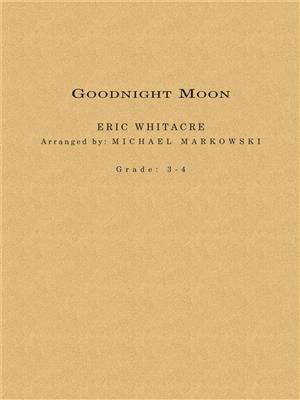 £118.99
£118.99Goodnight Moon - Eric Whitacre
Over the past few years I must have read Goodnight Moon to my son a thousand times - maybe more. Somewhere around reading number 500, I began hearing little musical fragments as I read, and over time those fragments began toblossom into a simple, sweet lullaby. I knew it was a long shot, but I asked my manager, Claire Long, to contact HarperCollins and see if they would allow the text to be set to music. To my surprise and delight they agreed - thefirst time they had ever allowed Goodnight Moon to be used in such a way. I composed the piece relatively quickly, originally setting the text for harp, string orchestra, and my son's mother, soprano Hila Plitmann. I laterarranged Goodnight Moon for SATB choir and piano. More recently, my dear friend Verena Msenbichler-Bryant arranged the piece for wind ensemble and soloist. The melody of Goodnight Moon will forever make me think of those quietnights, reading my son to sleep. -Eric Whitacre
Estimated dispatch 7-14 working days
-
 £164.99
£164.99Trumpet Concerto - Satoshi Yagisawa
Commissioned by Japan's Central Air Self Defense Force BandWhen I received this commission, I thought of a regular piece for wind band, but as my preparations continued I heard so much about the band's outstanding trumpeter Kenichi Kurisu that I ended up writing a concerto for him. The Self Defense Force audience includes those without much chance to otherwise hear live music. With that in mind I realized I also had the challenge of creating a melody that was compelling.Using the classical sonata as a model I made this song with simple movements and included a signature chorus in the middle section. Although this piece is performed with band, a version for piano accompaniment was created by pianist Orimo Manabu for the 20th Anniversary of "The Trumpet Concert."This edition of Trumpet Concerto was offered for an American Premier at the 2013 Midwest International Band and Orchestra Clinic, Robert Sullivan soloist with the Kagoshima Joho High School Wind Orchestra.(Satoshi Yagisawa)
Estimated dispatch 7-14 working days
-
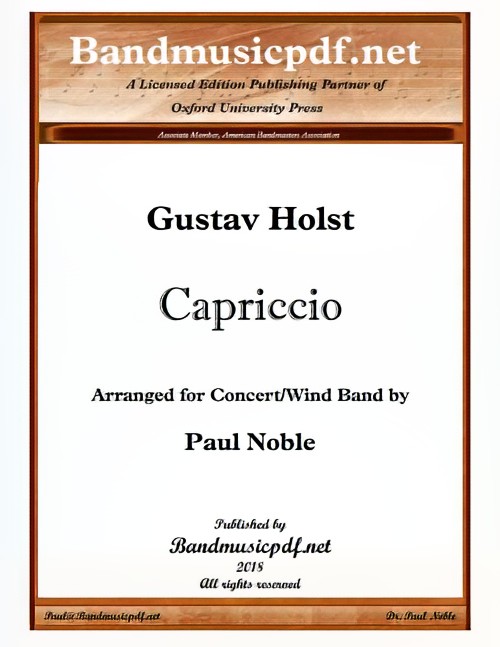 £140.00
£140.00Capriccio (Concert Band - Score and Parts) - Holst, Gustav - Noble, Paul
The following notes have been excerpted by the arranger from those presented in the Introduction by Imogen Holst, daughter of Gustav Holst: Holst wrote this work in the spring of 1932, while he was guest Lecturer in Composition at Harvard University. He had been asked by Nathaniel Shilkret to write 'a short radio piece, not longer than five or six minutes.' for a composers' series on folk music themes. Holst wrote to me on 13 May 1932, saying: 'On May 1 I started sketching a piece for Shilkret's Radio jazz band in New York. I finished the sketch on the 4th and the full score on the 8th... Shilkret wanted something on American airs but I've left them out because I prefer my own so he may reject the thing.' Shilkret was enthusiastic about the piece, but he was unable to use it for his series. 'I hate to give it up,' he told the composer, 'but I cannot play it because it is not based on a definite English or American folk theme.' Holst never revised his hurriedly-written work, probably because he had too many other things to write during the remaining two years of his life, when he was having to spend a good deal of his time in hospital. The autograph manuscript of his original full score is in the British Library, MS Add.47833. The work had no name: Holst referred to it either as his 'Jazz band piece' or as 'Mr. Shilkret's Maggot.' The score needed editing. There were gaps and patches, with incomplete dynamics and phrase marks. I made the version for orchestra and named it 'Capriccio' in spite of the viola's (now saxophone's) expressive opening, because from the moment of the marimba's first animated remark there can be no doubt about the mood of the music. - Imogen Holst (1968)
Estimated dispatch 7-14 working days
-
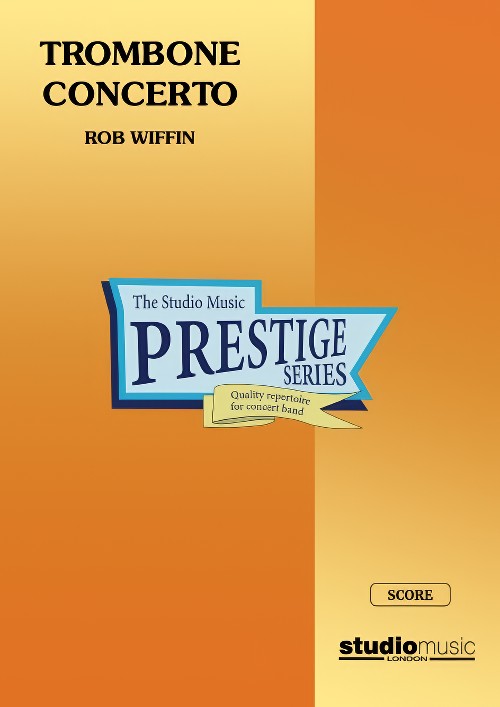 £32.95
£32.95Trombone Concerto (Trombone Solo with Concert Band - Score only) - Wiffin, Rob
The composer writes:My Trombone Concerto was commissioned by Brett Baker following an earlier piece I had written for him called Shout. The concerto was composed in Spain the summer of 2010. Once I started writing I realised this concerto was, inevitably, going to draw on my own experiences as a trombone player.The first movement was really a matter of getting the right thematic ideas and balancing the tutti and solo passages so, for formal structure, I studied the Gordon Jacob Trombone Concerto. There is a lyrical section preceding the first Allegro that owes much in spirit (but not the actual music) to The Eternal Quest, Ray Steadman-Allen's Salvation Army solo.The slow movement seemed determined to come out in the vein of a Richard Strauss song. I wanted to write ineluctably cantabile as we trombone players rarely get a chance to play the melody! There is a brief allusion to that wonderful moment when the trombone gets to sing above the orchestra in Sibelius' seventh symphony. Arthur Wilson (my teacher at college) died in the summer of 2010 so it seemed appropriate to dedicate this movement to him.The last movement is the lightest of the three in style and is slightly jazz-inflected, hopefully providing some fun for the soloist.While wanting to test the instrument, I did not set out with the intention of making the concerto difficult but there are undoubtedly challenges of technique, range and style to be met by the soloist.Recorded on Polyphonic CD QPRM161D Roman TrilogyDuration: 19:30
Estimated dispatch 7-14 working days
-
 £164.95
£164.95Trombone Concerto (Trombone Solo with Concert Band - Score and Parts) - Wiffin, Rob
The composer writes:My Trombone Concerto was commissioned by Brett Baker following an earlier piece I had written for him called Shout. The concerto was composed in Spain the summer of 2010. Once I started writing I realised this concerto was, inevitably, going to draw on my own experiences as a trombone player.The first movement was really a matter of getting the right thematic ideas and balancing the tutti and solo passages so, for formal structure, I studied the Gordon Jacob Trombone Concerto. There is a lyrical section preceding the first Allegro that owes much in spirit (but not the actual music) to The Eternal Quest, Ray Steadman-Allen's Salvation Army solo.The slow movement seemed determined to come out in the vein of a Richard Strauss song. I wanted to write ineluctably cantabile as we trombone players rarely get a chance to play the melody! There is a brief allusion to that wonderful moment when the trombone gets to sing above the orchestra in Sibelius' seventh symphony. Arthur Wilson (my teacher at college) died in the summer of 2010 so it seemed appropriate to dedicate this movement to him.The last movement is the lightest of the three in style and is slightly jazz-inflected, hopefully providing some fun for the soloist.While wanting to test the instrument, I did not set out with the intention of making the concerto difficult but there are undoubtedly challenges of technique, range and style to be met by the soloist.Recorded on Polyphonic CD QPRM161D Roman TrilogyDuration: 19:30
Estimated dispatch 7-14 working days
-
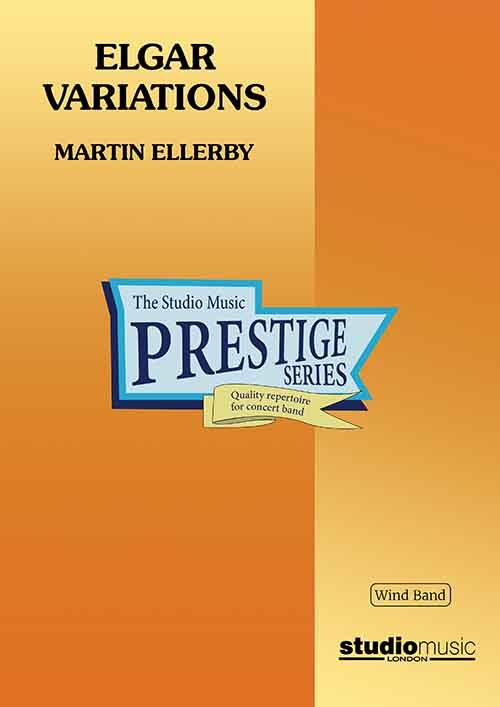 £164.95
£164.95Elgar Variations (Concert Band - Score and Parts) - Ellerby, Martin
The year 2007 marked the 150th anniversary of the birth of the British composer Sir Edward Elgar (1857-1934) and as such I thought it an appropriate moment to write something in tribute to this event. There are quite a few enigmas about this piece and they are all intentional! First and foremost is that the variations are not constructed on any of Elgar's actual themes. Rather I have written a sequence of contrasting sections (all played without a break) on the essence and character of his musical style. I have also written this work with bands, the soloists within, conductors and, not least, their audience firmly in mind. The language is essentially tonal and the test musical rather than overtly technical. There are no tempo indications other than suggested metronome marks. I have deliberately kept things to a minimum as the true test here is to find the style and interpret that aspect over the whole structure. Whereas the faster sections are more or less self explanatory the slower parts require deliberate rubato and much feeling. This is for the conductors to discover and I encourage them to do so. Adjudicators should be fully aware that I sanction this aspect but it requires an insight and understanding to successfully execute so 'any old thing' will not suffice! The 'variation' commencing at rehearsal letter P is the emotional core of the piece and requires a passionate but not saccharine approach to pacing and sensuality. The cadenza type material is built into the process rather than being a separate sequence of entities. There are many allusions to the music of Elgar here without recourse to blatant pastiche - if it is thought of as a series of songs and dances this may help. The final comment is the dedication, after one of Elgar's own but subtly adjusted: to my friend pictured within - never to be revealed - now there's an enigma!- Martin EllerbyDuration: 14.00Recorded on Polyphonic QPRM155D Scenes from Childhood (Great British Music for Wind Band Vol.15), Royal Northern College of Music Wind Orchestra
Estimated dispatch 7-14 working days
-
 £32.95
£32.95Elgar Variations (Concert Band - Score only) - Ellerby, Martin
The year 2007 marked the 150th anniversary of the birth of the British composer Sir Edward Elgar (1857-1934) and as such I thought it an appropriate moment to write something in tribute to this event. There are quite a few enigmas about this piece and they are all intentional! First and foremost is that the variations are not constructed on any of Elgar's actual themes. Rather I have written a sequence of contrasting sections (all played without a break) on the essence and character of his musical style. I have also written this work with bands, the soloists within, conductors and, not least, their audience firmly in mind. The language is essentially tonal and the test musical rather than overtly technical. There are no tempo indications other than suggested metronome marks. I have deliberately kept things to a minimum as the true test here is to find the style and interpret that aspect over the whole structure. Whereas the faster sections are more or less self explanatory the slower parts require deliberate rubato and much feeling. This is for the conductors to discover and I encourage them to do so. Adjudicators should be fully aware that I sanction this aspect but it requires an insight and understanding to successfully execute so 'any old thing' will not suffice! The 'variation' commencing at rehearsal letter P is the emotional core of the piece and requires a passionate but not saccharine approach to pacing and sensuality. The cadenza type material is built into the process rather than being a separate sequence of entities. There are many allusions to the music of Elgar here without recourse to blatant pastiche - if it is thought of as a series of songs and dances this may help. The final comment is the dedication, after one of Elgar's own but subtly adjusted: to my friend pictured within - never to be revealed - now there's an enigma!- Martin EllerbyDuration: 14.00Recorded on Polyphonic QPRM155D Scenes from Childhood (Great British Music for Wind Band Vol.15), Royal Northern College of Music Wind Orchestra
Estimated dispatch 7-14 working days
-
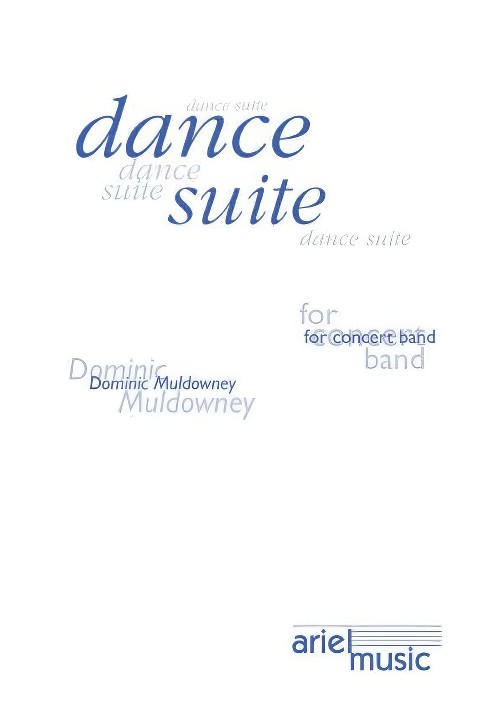 £160.00
£160.00DANCE SUITE (Concert Band) - Muldowney, Dominic
Includes:1. Hey2. Pavane/Waltz3. Polka4. Waltz/Galliard5. Tangos6. Break-DanceDance Suite displays a variety of historical dance forms from a twentieth century viewpoint. The six dances move forward historically from the ancient Hey, through Waltz and Polka, to the sophisticated Tango and the jazz tradition. The rhythm that typifies each dance is constantly under attack, sometimes from a different dance style altogether. These intrusive elements are most obvious in the final dance and prompts the double meaning of the title.I. HEYHey is constructed like a mediaeval motet, where the main blocks of material are rhythmically unconnected to one another. The percussion is the most disconnected of all and seems to have arrived from a Chinese carnival. The scoring alludes to the eight, four and two foot pipes of a baroque organ.I. PAVANE/WALTZAfter a nod in the direction of Dowland's Lachrimae Pavan, the piece seems to wander to and fro between the 16th century and the 19th century world of the Lehr waltz.I. POLKAThe Polka is derived from a four bar fragment found in Stravinsky's sketchbook for The Rite of Spring above which is written: "Dieppe Polka".I. WALTZ/GALLIARDThis is a reversal of the date-shift process in the second movement, in that the wandering goes backwards rather than forwards, particularly to the William Byrd of the Fitzwilliam Virginal Book.I. TANGOSA slow sentimental tango is sandwiched between an abstract deconstructed one, both of which are developed in Dominic Muldowney's opera The Voluptuous Tango.I. BREAK-DANCEBreak-Dance is the fastest, hardest and strangest movement. Its exuberance fractures the texture, which slowly crumbles midway through the movement, only to be resurrected mirror fashion. The piece is a species of palindrome with no true centre, hence: "Break-Dance".Conductors are free to make a selection from these dances for festival or competition programmes, when limited performance time is available.
Estimated dispatch 7-14 working days
-
Perpetua - Peter Meechan
When I write music I feel a need to comment on the world around us - which, right now, is not always a happy society. But I also want to write music about the world I want to live in - about the joy, beauty, hope, and love I see in our communities.In writing Perpetua I wanted to compose a piece of perpetual motion, that is challenging, exciting, and fun - all brought together through a sense of joy.Perpetua was commissioned by Foothills Concert Band (Calgary, AB, Canada) and their conductor Anthony Reimer.
Estimated dispatch 5-14 working days
-
 £174.99
£174.99Two Symphonic Interludes Wind Band Set (Score & Parts)
Based on the poems by German poet Carl Hauptmann (late Romanticism) and the English poet William Wordsworth (early Romanticism). Carl Hauptmann was in poor health as a child, but highly intelligent. He studied philosophy, psychology and biology. In the latter he was admitted to the degree of doctor. His marriage provided financial independence, so that he could focus on his studies. Hauptmann wrote various novels, plays, poetry and scientific works. Night Twilight floats above the valley's night mists are hanging, there's a whispering brook. Now the covering veil is lifting quite: come and look! See the magic land before our gaze: tall as dreams the silver mountains stand, crossed by silent silver paths shining from a secret land. Noble, pure, the dreaming country sleeps. By the path the shadow black and hogh of a beach. a wisp of a white smoke creeps to the dark'ning sky. Where the valley is the darkest hued countless little lights shine silently. O my soul! Drink of solitude! Carl Hauptmann Wordsworth 'introduced' a new type of poetry, based on the speech of the common man. This was his answer to the poetry of the classicism which was bound by rigid rules. His definition of poetry was: the spontaneous overflow of powerful feelings from emotions recollected in tranquility. My heart leaps up when I behold a rainbow in the sky My heart leaps up when I behold A rainbow in the sky: So was it when my life began. So is it now I am a man. So be it when I shall grow old, Or let me die! The Child is father of the Man. And I could wish my days to be Bound each to each by natural piety. William Wordsworth In a truly poetic manner Harrie Janssen has transformed the contemplative thoughts of the poets into two compositions for Concert Band. 10:45
Estimated dispatch 7-14 working days
